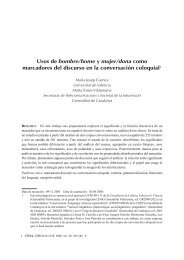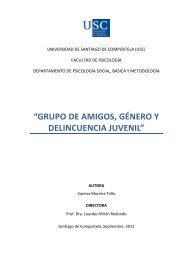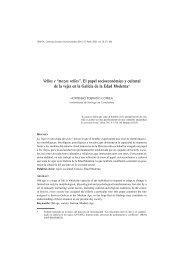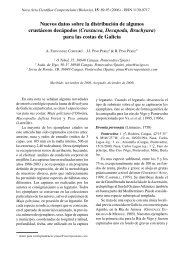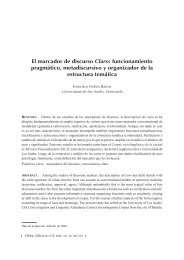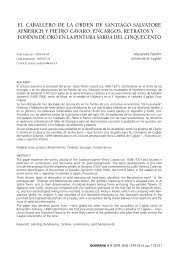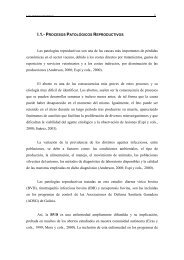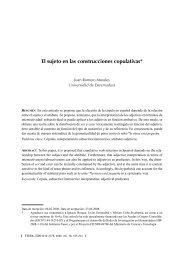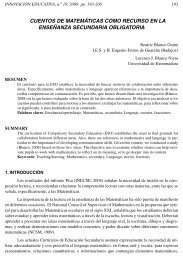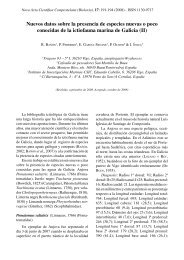- Page 1: Universidade de Santiago de Compost
- Page 5: Dedicado a Carlos y a Rocío
- Page 8 and 9: A Conxita Márquez y su equipo de l
- Page 10 and 11: 2 4.3 Uso del modelo de flujo de en
- Page 13: SUMMARY The aim of this research is
- Page 17 and 18: Rubrics for the analysis of process
- Page 19 and 20: position on the trophic pyramid, fo
- Page 21 and 22: improvement in the complexity of th
- Page 23: I FUNDAMENTACIÓN
- Page 26 and 27: 26 Capítulo 1: Introducción hace
- Page 28 and 29: 28 Capítulo 1: Introducción Aunqu
- Page 30 and 31: 30 Capítulo 1: Introducción 2. An
- Page 32 and 33: 32 Capítulo 1: Introducción El qu
- Page 34 and 35: 34 Capítulo 2: Marco teórico rele
- Page 36 and 37: 36 Capítulo 2: Marco teórico inva
- Page 38 and 39: 38 Capítulo 2: Marco teórico just
- Page 40 and 41: 40 Capítulo 2: Marco teórico most
- Page 42 and 43: 42 Capítulo 2: Marco teórico no e
- Page 44 and 45: 44 Capítulo 2: Marco teórico Difi
- Page 46 and 47: 46 Capítulo 2: Marco teórico curs
- Page 48 and 49: 48 Capítulo 2: Marco teórico dato
- Page 50 and 51: 50 Capítulo 2: Marco teórico que
- Page 52 and 53: 52 Capítulo 2: Marco teórico repr
- Page 54 and 55: 54 Capítulo 2: Marco teórico Gali
- Page 56 and 57: 56 Capítulo 2: Marco teórico de l
- Page 58 and 59: 58 Capítulo 2: Marco teórico 2.3
- Page 60 and 61: 60 Capítulo 2: Marco teórico alma
- Page 62 and 63: 62 Capítulo 2: Marco teórico soli
- Page 64 and 65:
64 Capítulo 2: Marco teórico ecos
- Page 66 and 67:
66 Capítulo 2: Marco teórico basa
- Page 68 and 69:
68 Capítulo 2: Marco teórico Ente
- Page 70 and 71:
70 Capítulo 2: Marco teórico cicl
- Page 72 and 73:
72 Capítulo 3: Metodología indisp
- Page 74 and 75:
74 Capítulo 3: Metodología nuevas
- Page 76 and 77:
76 Capítulo 3: Metodología propor
- Page 78 and 79:
78 Capítulo 3: Metodología Tiberg
- Page 80 and 81:
80 Capítulo 3: Metodología experi
- Page 82 and 83:
82 Capítulo 3: Metodología hay un
- Page 84 and 85:
84 Capítulo 3: Metodología de mov
- Page 86 and 87:
86 Capítulo 3: Metodología con el
- Page 89:
RESULTADOS Los resultados se aborda
- Page 92 and 93:
92 Capítulo 4: Estudio preliminar:
- Page 94 and 95:
94 Capítulo 4: Estudio preliminar:
- Page 96 and 97:
96 Capítulo 4: Estudio preliminar:
- Page 98 and 99:
98 Capítulo 4: Estudio preliminar:
- Page 100 and 101:
100 Capítulo 4: Estudio preliminar
- Page 102 and 103:
102 Capítulo 4: Estudio preliminar
- Page 104 and 105:
104 Capítulo 4: Estudio preliminar
- Page 106 and 107:
106 Capítulo 4: Estudio preliminar
- Page 108 and 109:
108 Capítulo 4: Estudio preliminar
- Page 110 and 111:
110 Capítulo 4: Estudio preliminar
- Page 112 and 113:
112 Capítulo 4: Estudio preliminar
- Page 114 and 115:
114 Capítulo 4: Estudio preliminar
- Page 116 and 117:
116 Capítulo 4: Estudio preliminar
- Page 118 and 119:
118 Capítulo 4: Estudio preliminar
- Page 120 and 121:
120 Capítulo 4: Estudio preliminar
- Page 122 and 123:
122 Capítulo 4: Estudio preliminar
- Page 124 and 125:
124 Capítulo 4: Estudio preliminar
- Page 126 and 127:
126 Capítulo 4: Estudio preliminar
- Page 129 and 130:
CAPÍTULO 5 DISEÑO E IMPLEMENTACI
- Page 131 and 132:
Capítulo 5: Diseño e implementaci
- Page 133 and 134:
Capítulo 5: Diseño e implementaci
- Page 135 and 136:
Capítulo 5: Diseño e implementaci
- Page 137 and 138:
Capítulo 5: Diseño e implementaci
- Page 139 and 140:
Capítulo 5: Diseño e implementaci
- Page 141 and 142:
Capítulo 5: Diseño e implementaci
- Page 143 and 144:
Capítulo 5: Diseño e implementaci
- Page 145 and 146:
Capítulo 5: Diseño e implementaci
- Page 147 and 148:
Capítulo 5: Diseño e implementaci
- Page 149 and 150:
Capítulo 5: Diseño e implementaci
- Page 151 and 152:
Capítulo 5: Diseño e implementaci
- Page 153 and 154:
Capítulo 5: Diseño e implementaci
- Page 155 and 156:
Capítulo 5: Diseño e implementaci
- Page 157 and 158:
Capítulo 5: Diseño e implementaci
- Page 159 and 160:
CAPÍTULO 6 CARACTERIZACIÓN DE NIV
- Page 161 and 162:
Capítulo 6:Caracterización de los
- Page 163 and 164:
Capítulo 6:Caracterización de los
- Page 165 and 166:
Capítulo 6:Caracterización de los
- Page 167 and 168:
Capítulo 6:Caracterización de los
- Page 169 and 170:
Capítulo 6:Caracterización de los
- Page 171 and 172:
Capítulo 6:Caracterización de los
- Page 173 and 174:
Capítulo 6:Caracterización de los
- Page 175 and 176:
Capítulo 6:Caracterización de los
- Page 177 and 178:
Capítulo 6:Caracterización de los
- Page 179 and 180:
Capítulo 6:Caracterización de los
- Page 181 and 182:
Capítulo 6:Caracterización de los
- Page 183 and 184:
Capítulo 6:Caracterización de los
- Page 185 and 186:
Capítulo 6:Caracterización de los
- Page 187 and 188:
Capítulo 6:Caracterización de los
- Page 189 and 190:
Capítulo 6:Caracterización de los
- Page 191 and 192:
Capítulo 6:Caracterización de los
- Page 193 and 194:
Capítulo 6:Caracterización de los
- Page 195 and 196:
Capítulo 6:Caracterización de los
- Page 197:
Capítulo 6:Caracterización de los
- Page 200 and 201:
200 Capítulo 7: Construcción y ap
- Page 202 and 203:
202 Capítulo 7: Construcción y ap
- Page 204 and 205:
204 Capítulo 7: Construcción y ap
- Page 206 and 207:
206 Capítulo 7: Construcción y ap
- Page 208 and 209:
208 Capítulo 7: Construcción y ap
- Page 210 and 211:
210 Capítulo 7: Construcción y ap
- Page 212 and 213:
212 Capítulo 7: Construcción y ap
- Page 214 and 215:
214 Capítulo 7: Construcción y ap
- Page 216 and 217:
Tabla 7.2. Distribución de episodi
- Page 218 and 219:
218 Capítulo 7: Construcción y ap
- Page 220 and 221:
220 Capítulo 7: Construcción y ap
- Page 222 and 223:
222 Capítulo 7: Construcción y ap
- Page 224 and 225:
224 Capítulo 7: Construcción y ap
- Page 226 and 227:
226 Capítulo 7: Construcción y ap
- Page 228 and 229:
228 Capítulo 7: Construcción y ap
- Page 230 and 231:
230 Capítulo 7: Construcción y ap
- Page 232 and 233:
Capítulo 7: Construcción y apropi
- Page 234 and 235:
Capítulo 7: Construcción y apropi
- Page 236 and 237:
Capítulo 7: Construcción y apropi
- Page 238 and 239:
Capítulo 7: Construcción y apropi
- Page 240 and 241:
Capítulo 7: Construcción y apropi
- Page 242 and 243:
Capítulo 7: Construcción y apropi
- Page 244 and 245:
Capítulo 7: Construcción y apropi
- Page 246 and 247:
Capítulo 7: Construcción y apropi
- Page 248 and 249:
Capítulo 7: Construcción y apropi
- Page 250 and 251:
Capítulo 8: Contextualización de
- Page 252 and 253:
252 Capítulo 8: Contextualización
- Page 254 and 255:
Capítulo 8: Contextualización de
- Page 256 and 257:
Capítulo 8: Contextualización de
- Page 258 and 259:
Capítulo 8: Contextualización de
- Page 260 and 261:
Capítulo 8: Contextualización de
- Page 262 and 263:
262 Capítulo 8: Contextualización
- Page 264 and 265:
264 Capítulo 8: Contextualización
- Page 266 and 267:
266 Capítulo 8: Contextualización
- Page 268 and 269:
268 Capítulo 8: Contextualización
- Page 270 and 271:
270 Capítulo 8: Contextualización
- Page 272 and 273:
272 Capítulo 8: Contextualización
- Page 274 and 275:
Capítulo 8: Contextualización de
- Page 276 and 277:
276 Capítulo 8: Contextualización
- Page 278 and 279:
Capítulo 8: Contextualización de
- Page 280 and 281:
Capítulo 8: Contextualización de
- Page 282 and 283:
Capítulo 8: Contextualización de
- Page 284 and 285:
Capítulo 8: Contextualización de
- Page 287:
III CONCLUSIONES E IMPLICACIONES ED
- Page 290 and 291:
290 Capítulo 9: Conclusiones e imp
- Page 292 and 293:
292 Capítulo 9: Conclusiones e imp
- Page 294 and 295:
294 Capítulo 9: Conclusiones e imp
- Page 296 and 297:
296 Capítulo 9: Conclusiones e imp
- Page 298 and 299:
298 Capítulo 9: Conclusiones e imp
- Page 301 and 302:
REFERENCIAS BIBLIOGRÁFICAS Adeniyi
- Page 303 and 304:
Referencias Bibliográficas Brown,
- Page 305 and 306:
Referencias Bibliográficas Fernán
- Page 307 and 308:
Referencias Bibliográficas Jiméne
- Page 309 and 310:
Referencias Bibliográficas Korfiat
- Page 311 and 312:
Referencias Bibliográficas Martí,
- Page 313 and 314:
Referencias Bibliográficas Potter,
- Page 315 and 316:
Referencias Bibliográficas Stake,
- Page 317 and 318:
ANEXOS
- Page 319 and 320:
Anexos ANEXO 1 PRUEBA DE SELECTIVID
- Page 321 and 322:
Anexos ANEXO 2 LIBROS DE TEXTO ANAL
- Page 323 and 324:
Anexos ANEXO 3 ACTIVIDADES DE LA UN
- Page 325 and 326:
Anexos Actividad sesión 2 ¿Que ci
- Page 327 and 328:
Anexos Actividad sesión 4 Activida
- Page 329 and 330:
Anexos 3. Pirámides tróficas dest
- Page 331 and 332:
Anexos Información de interese: 1)
- Page 333 and 334:
Anexos Actividad sesión 6 Evaluaci
- Page 335 and 336:
Anexos ANEXO 4 INFORMES ESCRITOS CO
- Page 337 and 338:
Anexos [Añadido tras la discusión
- Page 339 and 340:
Anexos Informe escrito grupo N, cla
- Page 341 and 342:
Transcripción 3ª sesión, clase 4
- Page 343 and 344:
30:04 Realización de la actividad
- Page 345 and 346:
78 79 80 81 82 83 84 85 86 87 88 89
- Page 347 and 348:
Transcripción 3ª sesión, clase 4
- Page 349 and 350:
6:59 Pirámide de producción 12 13
- Page 351 and 352:
38 39 40 41 42 43 44 45 fijades aqu
- Page 353 and 354:
25:45 Puesta en común de la pirám
- Page 355 and 356:
114 115 116 117 121 122 123 124 130
- Page 357 and 358:
Transcripción 3ª sesión, Clase 4
- Page 359 and 360:
30:04 Realización de la actividad
- Page 361 and 362:
83 84 85 86 87 88 89 90 91 92 93 94
- Page 363 and 364:
124 125 126 127 128 129 130 131 132
- Page 365 and 366:
Transcripción 3ª sesión, clase 4
- Page 367 and 368:
3 38 39 40 41 42 43 44 45 46 47 48
- Page 369 and 370:
5 84 85 86 87 88 89 90 91 98 99 100
- Page 371 and 372:
Transcripción 4ª sesión, clase 4
- Page 373 and 374:
3 43 44 45 46 47 48 49 50 51 52 53
- Page 375 and 376:
5 88 89 92 95 96 97 98 99 100 101 1
- Page 377 and 378:
7 122 123 124 125 126 127 128 129 1
- Page 379 and 380:
9 175 176 177 178 179 180 181 182 1
- Page 381 and 382:
2 13 14 15 16 17 18 19 20 21 22 23
- Page 383 and 384:
4 88 89 90 91 92 93 94 95 96 97 98
- Page 385 and 386:
6 127 128 129 130 131 132 133 134 1
- Page 387 and 388:
8 162 163 164 165 166 167 168 169 1
- Page 389 and 390:
Transcripción 5ª sesión, clase 4
- Page 391 and 392:
27 28 29 30 31 32 33 34 35 36 37 38
- Page 393 and 394:
73 74 75 76 77 78 79 80 81 82 86 87
- Page 395 and 396:
120 121 122 123 125 126 127 128 129
- Page 397 and 398:
173 174 175 176 177 178 179 180 181
- Page 399 and 400:
Transcripción 5ª sesión, clase 4
- Page 401 and 402:
3 23 24 25 26 27 28 29 30 31 32 33
- Page 403 and 404:
5 12:30 13:01 Relación nivel tróf
- Page 405 and 406:
7 17:08 Actividad ecosistemas marin
- Page 407 and 408:
9 132 133 134 135 136 137 138 139 1
- Page 409 and 410:
11 173 174 175 176 177 178 179 180
- Page 411 and 412:
13 221 222 223 224 225 226 227 228
- Page 413 and 414:
2 11 12 13 14 15 16 17 18 19 20 21
- Page 415 and 416:
4 44 45 46 47 48 49 50 51 52 53 54
- Page 417 and 418:
6 85 86 87 88 89 90 91 92 93 94 95
- Page 419 and 420:
8 130 131 132 133 134 135 136 137 1
- Page 421 and 422:
10 168 179 170 171 172 174 175 176
- Page 423 and 424:
2 12 13 14 15 16 17 18 19 20 21 22
- Page 425 and 426:
4 53 54 55 56 57 58 59 60 63 64 65
- Page 427 and 428:
6 89 90 91 92 93 94 95 96 97 98 99
- Page 429 and 430:
8 140 141 142 143 144 145 146 147 1
- Page 431 and 432:
10 187 195 196 197 biología… [ha
- Page 433 and 434:
2 5:32 EP2. Realización de la acti
- Page 435 and 436:
4 23 24 25 26 27 28 29 30 31 32 33
- Page 437 and 438:
6 61 62 63 64 65 66 67 68 69 70 71
- Page 439 and 440:
8 93 94 95 96 97 98 99 100 101 102
- Page 441 and 442:
10 131 132 133 134 135 136 137 138
- Page 443 and 444:
12 31:55 EP3. Puesta en común. 172
- Page 445:
14 194 195 196 197 198 199 200 201
- Page 448 and 449:
10 11 12 13 14 15 16 17 18 19 20 21
- Page 450 and 451:
43 44 45 46 47 48 49 50 51 52 53 54
- Page 452 and 453:
80 81 82 83 84 85 86 87 88 89 90 91
- Page 454 and 455:
115 116 117 118 119 120 121 122 123
- Page 456 and 457:
156 157 158 159 160 161 162 163 164
- Page 458 and 459:
197 198 199 200 201 202 203 niveles
- Page 460 and 461:
10 11 12 13 14 15 16 17 18 19 20 21
- Page 462 and 463:
53 54 55 56 57 58 59 60 61 62 63 64
- Page 464 and 465:
101 102 103 104 105 106 107 108 109
- Page 466 and 467:
142 143 144 145 146 147 148 149 150
- Page 468 and 469:
187 188 189 190 191 192 193 194 195
- Page 470 and 471:
Transcripción 3ª sesión, clase 3
- Page 472 and 473:
3 38 39 40 41 42 43 44 45 46 47 48
- Page 474 and 475:
5 88 89 90 91 92 93 94 95 96 97 98
- Page 476 and 477:
7 134 135 136 137 138 139 140 Olga:
- Page 478 and 479:
2 13 14 15 16 18 19 20 22 23 24 25
- Page 480 and 481:
4 74 75 76 77 78 79 80 81 82 83 84
- Page 482 and 483:
Transcripción 3ª sesión, clase 3
- Page 484 and 485:
3 43 44 45 46 47 48 49 50 51 52 53
- Page 486 and 487:
5 93 94 95 96 97 98 99 100 101 102
- Page 488 and 489:
Transcripción 3ª sesión, clase 3
- Page 490 and 491:
3 29 30 31 32 33 34 35 36 37 38 39
- Page 492 and 493:
5 76 77 78 79 80 81 82 83 84 85 86
- Page 494 and 495:
7 8 9 10 11 12 13 14 15 16 17 18 19
- Page 496 and 497:
45 46 47 48 49 50 51 deben ser much
- Page 498 and 499:
16:32 Realización actividad pirám
- Page 500 and 501:
101 102 103 104 108 109 110 111 112
- Page 502 and 503:
148 149 150 151 153 154 155 156 157
- Page 504 and 505:
199 200 201 202 203 204 205 206 207
- Page 506 and 507:
2 4 5 6 7 8 9 10 11 12 13 14 15 16
- Page 508 and 509:
4 44 45 46 47 48 49 50 51 52 56 57
- Page 510 and 511:
6 87 88 89 90 91 92 93 94 95 96 97
- Page 512 and 513:
8 129 130 131 132 133 134 135 136 1
- Page 514 and 515:
10 164 165 166 167 168 169 170 171
- Page 516 and 517:
2 15 16 17 18 19 20 21 22 23 24 25
- Page 518 and 519:
4 43 44 45 46 47 48 49 50 51 52 53
- Page 520 and 521:
6 79 80 81 82 83 84 85 86 87 88 89
- Page 522 and 523:
8 121 122 123 124 128 136 137 138 1
- Page 524 and 525:
2 13 14 20 21 22 23 24 25 26 27 28
- Page 527 and 528:
Transcripción 4ª sesión, clase 3
- Page 529 and 530:
3 29 30 31 32 33 34 35 36 37 38 39
- Page 531 and 532:
5 101 102 103 104 105 106 107 108 1
- Page 533 and 534:
2 6:30 EP2. Realización de la acti
- Page 535 and 536:
4 24 25 26 27 28 29 30 31 35 36 37
- Page 537 and 538:
6 65 66 67 68 69 70 71 72 73 74 75
- Page 539 and 540:
8 104 105 106 107 108 115 116 117 1
- Page 541 and 542:
10 170 salmones, para que no se com
- Page 543 and 544:
12 13 14 15 16 17 18 19 20 21 22 23
- Page 545 and 546:
57 58 59 60 61 62 63 64 65 66 67 68
- Page 547 and 548:
108 109 110 111 Julia: peces, porqu
- Page 549 and 550:
18 19 20 21 22 23 24 25 26 27 28 29
- Page 551 and 552:
52 53 54 55 56 57 58 59 60 61 62 63
- Page 553 and 554:
Transcripción 4ª sesión, 4ºA, g
- Page 555 and 556:
3 21 22 23 24 25 26 27 28 29 30 31
- Page 557 and 558:
5 63 64 65 66 67 68 69 70 71 72 73
- Page 559 and 560:
7 107 108 109 110 111 112 113 114 1
- Page 561 and 562:
9 149 150 151 152 153 154 155 156 1
- Page 563 and 564:
2 22 23 24 25 26 30 31 32 33 34 35
- Page 565 and 566:
4 19:01 Realización de la activida
- Page 567 and 568:
6 108 109 110 111 112 113 117 120 1
- Page 569 and 570:
8 157 158 159 160 161 162 163 164 1
- Page 571 and 572:
2 20 21 22 23 24 30 31 32 33 34 35
- Page 573 and 574:
4 64 65 66 67 68 69 70 71 72 73 74
- Page 575 and 576:
6 103 104 105 106 107 108 109 110 1
- Page 577 and 578:
8 144 145 146 147 148 149 150 151 1
- Page 579 and 580:
10 189 190 191 192 193 194 195 196
- Page 581 and 582:
Transcripción 4ª sesión, clase 4
- Page 583 and 584:
44 45 46 47 48 49 50 51 52 53 54 55
- Page 585 and 586:
93 94 95 96 97 98 99 100 101 102 10
- Page 587 and 588:
149 150 151 152 153 154 155 156 157
- Page 589 and 590:
205 206 207 208 209 210 211 212 213
- Page 591 and 592:
255 256 257 258 Únicamente la grá
- Page 593 and 594:
2 14 15 16 17 18 19 20 21 22 23 24
- Page 595 and 596:
4 45 46 47 48 49 50 51 52 53 54 55
- Page 597 and 598:
6 80 81 82 83 84 85 86 87 88 89 90
- Page 599 and 600:
Transcripción 3ª sesión, clase 2
- Page 601 and 602:
33 34 35 37 38 42 43 44 45 46 47 48
- Page 603 and 604:
81 82 83 84 85 86 87 89 90 Iker: me
- Page 605 and 606:
2 5 6 7 8 9 10 30 31 32 33 34 35 36
- Page 607 and 608:
4 68 69 70 71 72 73 74 75 76 77 78
- Page 609 and 610:
2 7 8 9 10 11 12 13 14 15 16 17 18
- Page 611 and 612:
4 40 41 42 43 44 45 46 47 48 49 50
- Page 613 and 614:
Transcripción 3ª sesión, clase 2
- Page 615 and 616:
30 31 32 34 35 36 37 38 39 40 41 42
- Page 617 and 618:
71 72 73 74 75 76 77 78 79 80 81 82
- Page 619 and 620:
2 2:48 Repaso 4 5 6 7 8 9 10 11 12
- Page 621 and 622:
4 12:01 de la explicación de las p
- Page 623 and 624:
6 15:13 Pirámide de Biomasa 64 65
- Page 625 and 626:
8 20:50 Pirámide de energía 104 1
- Page 627 and 628:
10 117 1118 119 121 122 123 124 125
- Page 629 and 630:
12 168 169 170 171 172 173 174 175
- Page 631 and 632:
Transcripción 3ª sesión, Clase 1
- Page 633 and 634:
33 34 35 36 37 38 39 40 41 42 43 44
- Page 635 and 636:
80 81 82 83 84 85 86 87 88 89 90 91
- Page 637 and 638:
Transcripción 3ª sesión, Clase 1
- Page 639 and 640:
3 31 32 33 34 35 36 37 38 39 40 41
- Page 641:
5 76 77 78 79 80 81 82 83 84 85 86
- Page 644 and 645:
2 03:05 EP 2. Actividad modelo de e
- Page 646 and 647:
4 9:34 EP 3. Repaso de Biomasa y pr
- Page 648 and 649:
6 números. 69 70 71 72 73 74 75 76
- Page 650 and 651:
8 16:40 EP 5. Pirámide de Biomasa.
- Page 652 and 653:
10 22:24 EP 7. Actividad construcci
- Page 654 and 655:
12 156 157 158 159 160 161 162 163
- Page 656 and 657:
14 202 203 204 205 206 207 208 209
- Page 658 and 659:
Transcripción 3ª sesión, Clase 1
- Page 660 and 661:
3 31 32 33 34 35 36 37 38 39 40 41
- Page 662 and 663:
5 78 79 80 80.1 81 82 83 84 85 86 8



